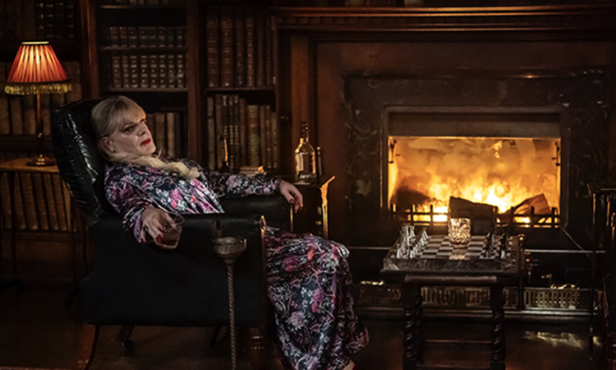From the very outset, Doctor Jekyll is concerned with class, and with the illusory notion of its boundaries. We know this because it opens with a journalist (Simon Callow) asserting the need to quash “the idea that human beings are essentially divided up into different groups, some of whom are superior to others”. Watching this daytime television from the sofa, young Rob (Scott Chambers) appears to be a living embodiment of the underclass. An ex-thief and ex-junkie, he is just recently released from jail, unemployed, with few prospects, and only has a place to stay thanks to the good will of his older brother Ewan (Morgan Watkins). Ewan has also secured Rob an interview for a carer’s job that might see the ex-con moving up in the world – for it is with Doctor Jekyll (Eddie Izzard), the controversial CEO of big pharma company Athanatos (from the Greek for ‘immortal’), who now lives as a recluse in a country mansion.
Of course, the film’s title instantly conjures Robert Louis Stevenson’s novella Strange Case of Dr Jekyll and Mr Hyde (1886), and as readily as Ewan’s television switches from a contemporary discussion of élite hierarchies to a broadcast of Ed Wood’s Plan 9 From Outer Space (1959), Rob himself will play out a contemporary drama of social mobility, of class exclusion and inclusion, through the idioms of campy gothic – campy because Blair Mowat’s over-the-top score of sweeping orchestrations and choral extravagance steeps everything in irony, even as both (Nina) Jekyll and (Rachel) Hyde have been regendered, taking even further the adaptive innovations of Roy Ward Baker’s Dr. Jekyll and Sister Hyde (1971). While Nina herself is not transgender (in a flashback to her childhood, she is clearly a girl), Izzard is famously genderfluid, and their casting in the rôle(s) of this dual character – oscillating between ego and id – serves to underscore Jekyll and Hyde’s transitional, bipolar nature. As this character essentially plays herself (in every sense of that phrase), Izzard gives us a performance of a performance, yielding high camp precisely through self-consciously hammy theatricality, yet remaining sly and hard to pin down.
Where Dan Kelly-Mulhern’s screenplay is certainly an updating of Stevenson, it is also a sequel of sorts, with Nina the granddaughter of the novella’s notorious Dr Henry Jekyll, and heiress to both his medical experiments and his peculiar condition. The echoes of the original operate even at the level of production: the surname of director Joe Stephenson (Chicken, 2015) is a homophone of the Scottish novelist’s, even as a character in the film also shares the novelist’s name, and the actor who plays Henry Jekyll in flashback, Jonathan Hyde, may have been cast in part for his evocative surname.
Unread, naïve and more than a little dim, Rob is outclassed at every turn in this new environment of privilege and affluence. Even Nina’s estate manager Sandra (Lindsay Duncan) looks down on him, rudely treating him with unconcealed contempt – but Nina is far more welcoming and kind, while the hidden Rachel too, for whom all humans are mere bodies, sees only Rob’s ‘potential’ and remains entirely undiscriminating about his background and status. Given room to move and opportunity to make something of himself, Rob wants in.
When Rob first arrives at the Jekyll mansion, he is distracted by a framed illustration of the monstrous cockroach from Franz Kafka’s Metamorphosis (1915) – and like the protagonist of that short story, Rob is set on a course of personal transformation, from outlaw to upright citizen, and maybe even from rags to riches, if his past – in the form of Maeve (Robyn Cara), who is his ex and the mother of his daughter – does not drag him back down again into addiction and criminality. Yet Rob is also the guest and employee of a woman who is herself subject to frequent metamorphosis – and his evolving relationship with her, unfolding like a chess game in which she is always two steps ahead of her opponent (and even of herself), is at the core of Stephenson’s film.
You can take Doctor Jekyll at face value, and see it as a supernatural tale of rapid class elevation, brought about through a soul-destroying Faustian contract – or you can read it allegorically as the story of one man internalising cynical lessons of calculation and manipulation which he has learnt from those around him. Either way, it shows Rob as an outsider looking in, with equal abhorrence and envy, at all the callous malevolence that he witnesses. One might say that these are two parts of a single person, as this bad boy, for all his outward appearances of having rehabiliitated and bettered himself, might never in the end come good, but merely learn to embrace – and hyde – his dark side.
Doctor Jekyll is out now on Digital Download and had its world première at FrightFest 2023. This review is based on an early festival cut of the movie.



